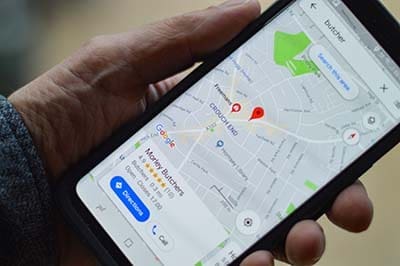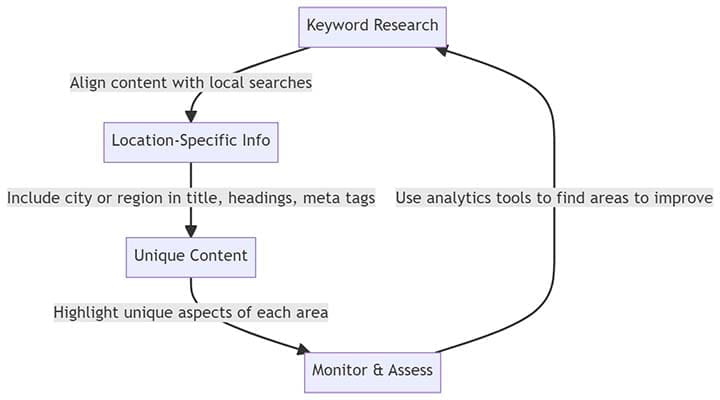Skyrocket Your Business Ranking: Guide to Local SEO!
Local SEO can be overwhelming, especially for beginners. But don’t panic! We’ll guide you through it.
Local SEO is all about improving online visibility in a certain area. To do this, optimize your website content, meta tags, and URLs with location-specific keywords. These are words that include your city or region.

The main components of Local SEO.
Managing online directories and review sites is key. They show customers how credible and reputable your business is. Claim and optimize profiles on sites like Google My Business, Yelp, and Facebook.

Managing online directories and reviews.
According to Moz’s survey, 15% of how Google ranks local businesses is based on reviews. So, cultivate positive reviews from happy customers.
This is just the tip of the iceberg – there’s more to learn. With this knowledge, you can start optimizing your website for local searches.
Fun Fact: BrightLocal found 88% of consumers trust online reviews as much as personal recommendations.
Understanding Local SEO
To understand local SEO, dive into the section “Understanding Local SEO” with sub-sections like “Definition of Local SEO” and “Importance of Local SEO for Businesses.” Gain insights into how these sub-sections offer solutions for grasping the fundamentals and significance of local SEO for beginners.
Definition of Local SEO
Local SEO helps businesses appear in search results when people search for services or products in a certain area. It involves improving the website’s content, metadata, and backlinks to make it visible in local search results.

To succeed in local SEO, you need to Identify relevant keywords.
To succeed in local SEO, you need to:
- Identify relevant keywords.
- Add location-specific information to your website content, like your address, phone number, and opening times.
- Manage online reviews and ratings. Positive reviews boost your reputation and help you rank higher. Responding to customer reviews shows potential customers that you care about their feedback and provide good service.
- Make sure your website is mobile-friendly since many people use mobile devices to find local services. A responsive design that works well on all devices will give a great user experience and help you rank higher.
Pro Tip: Monitor and analyze your local SEO strategies to identify areas for improvement and stay ahead of competitors. Update your website regularly with fresh content and adjust to changing search algorithms for higher rankings in local search queries. Local SEO is like having a GPS for your business, so even if customers are bad at directions, they can still find you!
Importance of Local SEO for Businesses
Local SEO is super important for businesses. It helps them reach their target audience in the same area. It lets them show up in local search results, so potential customers can find them more easily. With more people using mobile devices and location-based searches, a strong local SEO strategy is a must for businesses to stay ahead.
A great local SEO strategy can boost a business’s visibility and online presence. Optimizing their website with relevant keywords, getting local business listings, and getting positive reviews from customers can help them rank higher on search engine results pages (SERPs). This means more people will find them, increasing their trustworthiness.
Also, local SEO helps businesses build brand awareness in their target market. Businesses that optimized their websites for local search queries are more likely to show up first when people search locally. This means higher click-through rates, website traffic, and sales and conversions.
In fact, 50% of people who searched for something local on their phones went to a store that same day, according to Search Engine Land. This shows how important local SEO is for physical brick-and-mortar businesses.
Local SEO can give businesses a big advantage in today’s digital landscape. They can connect with potential customers who are searching for products or services nearby. So, no matter the size of your business, investing in a good local SEO strategy is essential for growth and success.
Key Steps to Implement Local SEO for Beginners
To implement local SEO for beginners, prepare your website and optimize your Google My Business listing. Conduct local keyword research and optimize your website content accordingly. These key steps pave the way for effective local SEO strategies, ensuring your business gets noticed in local search results.

Make sure you prepare your website for local SEO.
Preparing Your Website for Local SEO
For local SEO success, follow these tips:
- Keyword research: Identify relevant keywords potential customers may use when searching for local businesses like yours. Incorporate these into your website content.
- Optimize meta tags & headers: Make sure title tags, meta descriptions, and headers accurately represent the content on each page of your website. Include location-specific info to attract local visitors.
- Create unique landing pages: Dedicated landing pages for each location you operate in. Include detailed info like address, phone number, and business hours.
- Enhance website loading speed: Slow-loading websites can hurt user experience and search engine rankings. Optimize images, minimize code, and leverage caching techniques to improve loading times.
- Claim Google Business Profile listing: Register your business on Google My Business for local SEO success. Verify contact details and opening hours to boost visibility in Google Maps and local search results.
- Obtain positive online reviews: Encourage satisfied customers to leave reviews on Google, Yelp, or industry-specific directories. Positive reviews build trust and authority in local search results.
By implementing these strategies, you can increase visibility in local searches and attract more targeted traffic from potential customers near your business locations. Monitor and adapt your SEO efforts to stay ahead.
Unlock the potential of page titles and meta descriptions to captivate users and Google bots. Winning local SEO is all about making a killer first impression!
Optimizing Page Titles and Meta Descriptions

Optimizing Page Titles and Meta Descriptions
Optimizing your Page? Here’s a 6-step guide to help you get it done!
- Research relevant keywords. Use tools like Google Keyword Planner or SEMrush to find the keywords users are using when searching for products or services like yours.
- Keep it concise and relevant. Titles should be under 60 characters, and descriptions under 160. Make sure they accurately reflect the content of your page.
- Include target keywords. Integrate your target keywords naturally into both the title and description. This helps search engines recognize the relevance of your content.
- Write compelling copy. Craft persuasive copy that entices users to click on your website’s link in search results. Highlight what makes you special.
- Don’t duplicate content. Each page should have a unique title and description.
- Monitor performance. Track your optimized page titles and meta descriptions in terms of CTRs and overall website traffic. Make the necessary tweaks.
Remember, high-quality content is also important. Use proper HTML tags, create user-friendly URLs, and optimize images for better visibility.
Don’t let your competitors take the lead – start optimizing now! Give your website a mobile makeover and become the Tinder of local SEO – swipe right for success!
Ensuring Mobile Responsiveness
Ensuring Mobile Responsiveness is key for local SEO success. Here’s a 4-step guide to optimization:
- Simplify design: Keep it clean and intuitive so it fits smaller screens. Avoid cluttered menus, big images, and too much text, which can make navigation tricky on mobile devices.
- Use responsive themes: Choose a theme or template that adjusts the layout based on the device. This ensures content is displayed properly, with a seamless user experience across screens.
- Optimize images: Compress and resize to lower file size without compromising quality. Large image files can slow down loading speed, especially for mobiles with slower connections.
- Test multiple devices: Before launching, test on various mobiles. Identify any issues or inconsistencies before you go live.
Plus, optimize for mobile beyond the technical stuff. Consider user context and tailor your content accordingly. Give quick, relevant info and make sure important details are easy to access on small screens.
Creating and Optimizing Your Google Business Profile Listing
Get your business on the map with Google Business Profile – being invisible to potential customers is so last year! To optimize your listing, here’s what to do:
- Claim your business on Google Business Profile.
- Fill in accurate & detailed info, such as business name, address, phone number, hours, etc.
- Add high-quality photos of your products, services, & premises.
- Solicit reviews from satisfied customers.
- Regularly update the listing with promotions or events.

Setting Up Google My Business Account
Also, choose relevant categories & add keywords to the description. Utilize features like Google Posts & Q&A sections to engage customers directly.
Did you know businesses with complete & detailed listings are twice as likely to be considered reputable? Investing time in creating an informative profile can help draw more customers. For example, a local bakery increased its foot traffic & received positive reviews after optimizing its listing.
Take action now! Follow these steps to create an impressive Google My Business listing that’ll boost your local SEO & help you grow your customer base.
Setting Up Google My Business Account
Are you a beginner looking to implement local SEO? Setting up a Google My Business account is essential! Creating a profile on this platform can help your online presence and attract potential customers in your target area. Here’s a step-by-step guide:
- Head to the Google My Business website and click “Start Now.”
- Sign in to your Google account or create a new one.
- Enter your business name & address.
- Choose the category that best describes your business.
- Verify your listing by phone or mail.
- Once verified, provide accurate information about your business like contact details, website link & operating hours.

Nothing kills local SEO like wrong addresses and numbers.
For success, optimizing elements in your Google My Business account is important. Such as adding high-quality photos, encouraging customer reviews & regularly updating relevant info. With increased competition, an optimized GMB account is crucial for visibility in local search results.
Google officially launched ‘Google Places’ in April 2010, which later evolved into ‘Google My Business.’ This platform has become an integral part of local SEO. Ensure your business info is accurate – nothing kills local SEO like wrong addresses and numbers.
Providing Accurate Business Information
Accurate business info is essential for local SEO success. It ensures potential customers can find your business quickly and trust what they uncover. One way to ensure accuracy is by creating a well-structured table. This should include:
| Business Name | Address | Phone Number | Website |
|---|---|---|---|
| Your Business Name | Your Business Address | Your Business Phone Number | Your Business Website |
Having all this in a table format makes it easy for search engines and users to access the details they need. Additionally, the info must be up-to-date and consistent across all online platforms. This helps create credibility, increasing local search results.
You should also claim and optimize your Google My Business listing. It allows you to manage your business’s online presence, including opening hours, photos, and reviews.
The history of accurate business information is interesting. In the past, businesses just had directories and phone books. But now, due to digital marketing, providing accurate info is more complicated because of a plethora of online directories and review sites.
Forego the search for local keywords – listen to the conversations in your neighborhood to find the hidden gems.

It’s essential for businesses to do local keyword research to optimize their online presence.
Conducting Local Keyword Research
It’s essential for businesses to do local keyword research to optimize their online presence. To do that, follow
- Brainstorm potential customer search terms.
- Use online tools.
- Analyze competitors’ keywords.
- Refine list.
- Monitor performance & adjust.
Don’t only rely on generic keywords. Focus on localized ones that match user intent. Keep up with trends & algorithms. Understand search behavior & user intent. Know the history of local keyword research. It started with search engine evolution. Now it’s a must-have SEO strategy. Finding the right local keywords is like searching for a needle in a haystack!
Identifying Relevant Local Keywords
Local keyword research is essential for successful local SEO. Targeting correct keywords can help businesses become more visible in local search results and draw in more potential customers.
To identify suitable local keywords, there are three basic steps to follow:
- Know your target audience. Get an idea of what phrases and terms people in your locality use when searching for your product or service. Utilize tools like Google Trends and Keyword Planner to understand popular search words.
- Analyze competitor keywords. See which keywords your competitors are targeting. This will give you an idea of what works within your industry and local area. Use tools like SEMrush or Ahrefs to see which keywords are beneficial for your competitors.
- Investigate long-tail keywords. Long-tail keywords are longer, precise phrases that often have less competition but better conversion rates. For instance, instead of aiming for ‘bakery’, try ‘gluten-free bakery Seattle.’ These longer phrases help attract customers who are specifically looking for what you offer in their area.
By following these steps, you’ll be able to find relevant local keywords that will strengthen your online presence and bring more visitors to your website. Also, always remember to keep track of the selected keywords’ performance to ensure they remain effective.
Using Keyword Research Tools
Using keyword research tools is key for successful local SEO. They aid in finding the right words to target, looking at search trends, and understanding what users want. Employing these tools helps firms optimize their content and rise local searches.
To benefit from keyword research tools, knowing how they work and how to make the most of them is important. Here’s a table with some popular ones and their features:
| Tool Name | Key Features |
|---|---|
| Google Keyword Planner | Offers keyword ideas, search volume data, and competition level for keywords. |
| Moz Keyword Explorer | Comprehensive keyword analysis, including difficulty score, organic CTR, and priority score. |
| SEMrush | In-depth insights into competitor keywords, rankings, and backlink opportunities. |
| Ahrefs | Detailed analysis of competitor backlinks, organic traffic data, and keyword rankings. |
| KeywordTool.io | Generates long-tail keyword suggestions using Google Autocomplete. |
Knowing each tool’s special features helps businesses pick the right one for their local SEO plan.
Let’s take a look at an example to show the importance of keyword research tools. A small bakery in a busy city wished to be more visible online and get more customers. By doing thorough keyword research with Google Keyword Planner, they discovered a high demand for specialty cakes in their area with little opposition from other bakeries.
Based on this info, the bakery enhanced its website content by including relevant keywords like “specialty cakes,” “custom cakes,” and “birthday cakes.” This caused their site to rank higher in local searches for those words.
By taking advantage of keyword research tools and having targeted keywords in their content strategy, businesses can significantly boost their local SEO and drive more organic traffic to their websites.
Optimizing Website Content for Local SEO

Include relevant local keywords in your content.
Include relevant local keywords in your content. Optimize meta tags, titles, and descriptions with location-specific keywords for organic rankings. Create content that highlights the benefits of your products or services for local customers. Use schema markup to provide search engines with info about your business, such as address and phone number.
Also, make sure your website loads quickly, is mobile-friendly and has a user-friendly navigation structure. Utilize online directories and review websites to build citations and positive reviews. Focus on obtaining backlinks from reputable local sources. And update your website regularly with fresh content.
Don’t forget to optimize images on your website. Use descriptive file names and alt text containing relevant local keywords.
Doing all this will help boost your website’s visibility and attract potential customers. 50% of people who do a local search on their smartphone visit a store within a day. So, find the right blend of local keywords to get the best results!
Incorporating Local Keywords in Page Content
Localizing keywords in your page content is key for successful Local SEO. This assists search engines in recognizing your website’s connection to certain places, driving more focused traffic. Here’s a quick 5-step guide to localizing your page content:
- Search for local keywords: First, identify the keywords applicable to your business and location. Use keyword research tools or speak to an SEO professional for advice.
- Optimize meta tags: Be sure to include localized keywords in your meta title and description. Doing this will enhance the visibility of your pages in search engine results.
- Add localized content: Create unique and valuable content that includes the local keywords. Ensure it gives users value and effectively conveys your business’s relevance to the target locations.
- Enhance headings and subheadings: Include localized keywords in your titles and subtitles. Not only do they make your content more readable, but they also have a huge impact on SEO rankings.
- Create internal links with anchor text: When linking pages on your website, use anchor text that has relevant local keywords. This aids search engines in understanding the context of your content and boosts its visibility.
It’s essential to localize keywords throughout your page content to optimize your website for Local SEO success!
Furthermore, Google gets over 63,000 searches per second daily (source: Internet Live Stats). This staggering statistic shows the importance of having a strong online presence with expertly optimized local content to stand out in search engine results and draw in potential customers.
Ready to level up your SEO game with location-specific landing pages? It’s like winning a game of hide and seek with your competitors!
Writing Location-Specific Landing Pages

The process of writing location-specific landing pages.
Creating location-specific landing pages is an essential task in local SEO. These pages are crafted to target people in a certain area specifically. By making content that fits the needs and desires of local people, businesses can increase their chances of ranking higher in regional search results.
To write location-specific landing pages, it’s important to consider several key points. Start with keyword research. Businesses can align their content with these searches by understanding what words people in a certain area use when searching for services or products. This helps the landing page be more visible and relevant in local search results.
Include location-specific info on the landing page too. This could be including the city or region in the title, headings, and meta tags. Plus, adding reviews from local customers can help make potential customers trust the business.
Unique content is essential for each location-specific page. Don’t duplicate content across multiple pages, as this will reduce search engine rankings. Instead, focus on highlighting things that make each area different, like special events or community involvement.
Pro Tip: Monitor and assess your location-specific pages using analytics tools regularly. This will help you find areas to improve and ensure your work pays off. Or, why not just spread your name and number on random bathroom stalls?
Building Citations and Local Business Listings
To ensure effective local SEO, master the art of building citations and local business listings. Understand the importance of citations and learn about quality sources for creating them. Additionally, discover the key strategies for managing and updating your citations for maximum impact.
Understanding Citations and Their Importance
Citations are essential for revamping a local business’s visibility and reliability online. They’re just mentions of the business’s name, address, and phone number (NAP) on various platforms such as directories, review sites, and social media profiles. They help customers find correct business information and aid their ranking in local search engine results.

Not this kind of NAP!
To understand citations better, let’s look at their key elements:
- Name – the full official name of the business.
- Address – the physical location of the business, including street, city/town, state, and postal/zip code.
- Phone Number – the primary contact number of the business.
- Website – the official website URL of the business.
- Categories – the categories the business falls under (e.g., restaurants, medical clinics).
Accurate citations across multiple platforms are vital to get the best results. Inconsistent info can cause confusion and hurt the business’s reputation. To correctly manage citations, use tools like Google My Business to create and manage listings on Google Maps or other search engine platforms. They allow businesses to update their info quickly and keep track of customer reviews.
Pro Tip: Audit your online citations often to spot any errors or missing info. This helps improve your local SEO by ensuring accurate listings across different online platforms, which won’t affect potential leads or customer trust.
Finding the best sources for building citations is like looking for a needle in a haystack, except the haystack is the internet, and the needle is the perfect directory listing.
Quality Sources for Building Citations
For effective citations, reliable sources are key. Ensure accuracy with high-quality directories, search engines, and social media platforms. Here’s a look at some popular options and their citation value:
| Directory | Domain Authority | Citation Value |
|---|---|---|
| Google My Business | 100 | High |
| Yelp | 94 | High |
| 95 | High | |
| Apple Maps | 89 | High |
| Yellow Pages | 87 | Medium |
Also, consider industry-specific directories and local chamber of commerce websites. They cater to specific niches, helping your business get seen.
For example, a small New York bakery was having trouble getting customers. So, they listed the bakery on multiple directories and review sites. And, it worked! They greatly increased foot traffic from tourists who discovered them this way.
The message is clear; when it comes to citations, quality matters more than quantity. Choose reliable sources that fit your target audience and watch your online presence skyrocket.
Online Directories and Business Listings
Online directories and business listings are essential for promoting local businesses and increasing their online visibility. Listing their business can help companies reach out to a larger audience and draw potential customers.
Websites such as Yellow Pages, Google My Business, and Yelp provide key information like contact details, website URLs, and customer reviews, allowing businesses to showcase their offerings effectively.
Surprisingly, these directories have been around since the late 1980s – starting with the digitization of telephone directories. With the rise of technology and the internet, these directories have become indispensable to modern business marketing strategies.
Joining the local Chamber of Commerce is like getting VIP access to the club of successful local businesses. Except here, you get more citations and listings with cheaper drinks!
Local Chamber of Commerce Websites
Local Chamber of Commerce Websites are crucial for building citations and local business listings. They offer many benefits, such as increased visibility, networking opportunities, and access to resources. Here is a table of the key features:
| City Chambers | County Chambers | State Chambers |
|---|---|---|
| Austin Chamber | Los Angeles County Chamber | California State Chamber |
| Dallas Chamber | Miami-Dade County Chamber | Texas State Chamber |
| Chicago Chamber | Cook County Chamber | Illinois State Chamber |
These websites act as directories and provide events, workshops, and advocacy information. By using these, businesses can stay up-to-date with trends and position themselves as active local business community members.
To make the most out of these websites, here are some suggestions:
- Be Active: Update your business information regularly. Participate in chamber events and engage with other members to strengthen relationships.
- Optimize Your Profile: Use relevant keywords in your profile description. Take advantage of the space for photos, videos, and testimonials to showcase products/services.
- Seek Educational Opportunities: Utilize educational workshops to learn new skills and industry best practices. This boosts knowledge and portrays you as a professional.
By correctly utilizing Local Chamber of Commerce Websites, businesses can gain visibility and reputation while networking and staying informed. Embrace these suggestions to elevate their online presence and become reputable in their local community. Managing and updating citations is like playing a game of Whack-a-Mole – except you’re dealing with outdated phone numbers, incorrect addresses, and duplicates.
Managing and Updating Citations
To be successful, businesses must manage and update their citations. This involves keeping accurate, consistent info across various online platforms. Here’s how:
- Constantly monitor all listings to ensure the business name, address, phone number, website URL, and hours are up-to-date.
- Keep track of major directories (e.g., Google My Business, Yelp, Facebook) as well as industry-specific ones.
- Respond promptly and professionally to customer reviews or feedback. It shows you care about them and are involved.
- Use citation management tools or services to streamline updating info across directories.
- Audit your citations regularly to identify any inconsistencies or inaccuracies.
Managing citations helps build trust with target customers, boosts local search rankings, and increases the customer base. Further, businesses should:
- Claim ownership of listings to ensure accuracy.
- Use keywords in citations to improve search engine rankings.
- Encourage customers to leave positive reviews.
- Monitor competitor citations to gain insights into successful strategies.
By doing this, businesses can get the most out of their citation management efforts, become more visible online, and drive more customers their way. Here’s a tip: mention free pizza in your article and watch the online community flock to your website!
Acquiring Local Backlinks
To enhance your local SEO strategy and boost your website’s visibility, delve into the section on Acquiring Local Backlinks. Discover the importance of backlinks for local SEO and explore effective methods to acquire valuable local backlinks. Gain insights into how these strategies can significantly impact your website’s rankings and presence in local search results.
Importance of Backlinks for Local SEO
Backlinks are a must-have for local SEO! They act as a “vote of confidence” from other websites, telling search engines that your content is valuable and trustworthy. Here are five key points on why backlinks are crucial for local SEO:
- Improved Organic Rankings: Backlinks help boost a website’s organic rankings. When reputable websites link to your local biz site, search engines take it as a sign of quality and authority.
- Increased Website Traffic: More traffic comes to your local business website when users click on a link from an authoritative source.
- Local Relevance: Backlinks from local sites and directories boost visibility in the local area. These links show that your biz is relevant and trustworthy in its geographic region.
- Better Indexing: Search engine crawlers find new web pages through backlinks. If your site has high-quality backlinks, search engines will crawl and index it, increasing its chances of appearing in relevant searches.
- Brand Authority: Backlinks help establish your brand’s authority online. When reputable websites link to yours, it adds credibility and boosts the perception of expertise towards your business.
Building backlinks should be done strategically and organically to avoid penalties from search engines. Focus on acquiring high-quality backlinks rather than going after quantity alone. Also, create engaging and shareable content to attract backlinks from other sites interested in referencing valuable information or resources.
Remember, not all backlinks are equal; quality matters over quantity. A single highly authoritative backlink is worth more than multiple low-quality ones.
Moz’s study shows backlinks are one of the top-ranking factors for search engines. Investing time and effort in acquiring local backlinks can significantly impact your website’s visibility and overall SEO performance. Get your digital real estate in order and ensure you don’t live on the outskirts of Google search results!
Methods for Acquiring Local Backlinks
Enhance your website’s visibility with local backlinks! Here are three great ways to get them:
- Team Up: Reach out to other companies in your industry and collaborate on content and events. This will build relationships and strengthen your backlinks.
- Connect with Local Orgs: Get involved in community organizations to show off your expertise and open up backlink opportunities.
- Use Directories and Reviews: List your business on local directories and review sites with a link to your website. Positive reviews from customers can also act as backlinks.
Create high-quality content specifically for the local audience and monitor your backlinks regularly for the best results. Time to assemble the ultimate superhero squad that’ll save your site’s rankings!
Partnering with Local Organizations and Businesses
Acquiring local backlinks? Partner with local organizations and businesses! Here’s how:
- Leverage their network and cred to gain links.
- Sponsor events for backlinks and support your community.
- Promote their content and initiatives on social media for more links.
- Personalize your pitch to emphasize the mutual benefits of collaborating. That’ll boost your chances of success.
Be a guest on the local web! Bring a blog post and a housewarming gift.
Guest Blogging on Local Websites
Connect with local bloggers and website owners who are established in the online space. Produce meaningful content to the local audience and include a link to your website. Share the blog post on social media and interact with the local community to increase visibility and website traffic.
Guest blogging can bolster credibility and authority while driving targeted visitors to your website! Here’s a Pro Tip: When reaching out to local bloggers, make your pitch personal by referencing articles they have written or topics they are interested in. This will boost your chances of getting accepted as a guest blogger.
Cracking the code of local SEO performance is like deciphering a mysterious message from the search engine gods – but you don’t need an Enigma machine to solve it!
Tracking and Analyzing Local SEO Performance
To track and analyze local SEO performance effectively, utilize Google Analytics for Local SEO Tracking. Additionally, monitor your local search rankings closely. These two sub-sections offer insightful solutions to measure and evaluate the success of your local SEO efforts.
Using Google Analytics for Local SEO Tracking
Google Analytics is a great tool for monitoring and understanding the performance of your local SEO efforts. It provides useful insights into which keywords and strategies drive the most organic search traffic to your website and what results they generate. You can also track metrics like bounce rate, average session duration, and goal completions related to your local SEO.
Plus, with its segmentation features, you can compare the performance of different local markets or customer segments. This helps you identify trends and patterns that can inform targeted marketing campaigns or localized optimizations.
Using Google Analytics for local SEO tracking is essential for businesses that want to improve their search engine rankings and increase online visibility in their local markets. A study by Moz showed that businesses that actively use Google Analytics experienced better search engine rankings and higher online visibility than those that don’t.
So if you want to stay ahead of the competition and improve your local SEO strategy, Google Analytics is the telescope you need to make it happen.
Monitoring Local Search Rankings
Using tools and techniques that offer accurate, up-to-date data are essential to track local search rankings. Rank tracking tools show where your website stands in SERPs for keywords. They display the ranking info in an organized way so that you can monitor trends and changes over time.
Google Search Console is also useful. It’s free and provides info on how your website appears in searches. You can check for issues that may affect visibility in the performance section.
Analyzing competitors’ rankings is important too. Studying their strategies can give you ideas for improving your own website. Look at their keyword targeting, content strategy, and backlinks.
To help with local rankings, consider these tips:
- Focus on local keywords with high search volume
- Optimize your Google My Business listing
- Make sure mobile users have a great experience
- Get backlinks and citations from reputable local sources
By doing this, you can get more targeted traffic and conversions and stay ahead of the competition. So, let’s begin the journey of tracking and analyzing local SEO performance – or take a nap!
Conclusion and Next Steps
To wrap up your journey in local SEO for beginners, let’s dive into the Conclusion and Next Steps. We’ll start with a quick Recap of Key Points, followed by actionable steps you can take as a beginner. Lastly, we’ll touch upon future considerations for local SEO. Time to put your newfound knowledge into practice!
Recap of Key Points
- Analyze the data to spot patterns.
- Develop a strategy based on those insights.
- Create a project plan for successful implementation.
- Monitor and evaluate progress, making adjustments accordingly.
- Communicate with stakeholders to ensure their involvement.
- Stay updated and flexible to seize opportunities.
- Continuously learn and adapt to stay ahead.
Plus, consider external factors such as market trends and competitor analysis. Reassess our approach often to stay on track to success. Beginners, let’s dive in and swim with the sharks!
Actionable Steps for Beginners
Beginning something new can be overwhelming. Here’s a guide to get you started on the right foot!
- Step 1: Set Goals. Establish clear, achievable objectives and create a plan to reach them. A defined objective will help you stay motivated.
- Step 2: Find Resources. Look for reliable websites, books, and experts in the field for guidance. This will ensure you’re learning accurate info.
- Step 3: Practice. Spend time each day developing your skills and putting knowledge into action. Be patient with yourself as you progress.
Don’t let hesitation hold you back! Start today to unlock possibilities. Local SEO is like a game of hide and seek – make sure you have the best hiding spot.
Future Considerations for Local SEO
In the ever-evolving digital world, it’s key to consider future considerations for Local SEO if businesses want to grow their online presence. Here’s a comprehensive table with insights and data that can help optimize your local SEO strategy.
| Column 1 | Column 2 | Column 3 |
|---|---|---|
| Voice Search | Mobile Optimization | User-Generated Content |
| Gains popularity and impacts how users search. | Increasing use of mobile devices, ensuring a seamless experience. | Authenticity signals and boost organic SEO efforts. |
Voice search keeps revolutionizing how users find local businesses, so optimizing content with that in mind is important. Plus, optimizing websites for mobile devices is non-negotiable—users are using smartphones for local searches more and more, so a responsive and user-friendly mobile experience will help you rank higher.
Further, including user-generated content can be a game-changer. This acts as an endorsement from satisfied customers, which builds trust. Use customer reviews and testimonials to showcase positive experiences.
Adapting to these future considerations is essential to stay competitive. Ignoring them could mean missed opportunities and a gap between you and your competitors. Act now to future-proof your local SEO efforts!
Stay ahead of the curve by constantly monitoring industry advancements and adapting accordingly. Don’t let FOMO hold you back—take action today and watch your online presence flourish.
Frequently Asked Questions
FAQ: What is local SEO?
Local SEO refers to the process of optimizing a website or online presence to improve visibility in local search engine results. It involves various techniques to drive local organic traffic, attract local customers, and increase online visibility for businesses targeting a specific geographical area.
FAQ: How does local SEO differ from regular SEO?
While regular SEO focuses on improving overall visibility on the internet, local SEO specifically targets local searches and aims to attract customers within a specific geographic location. Local SEO often involves optimizing Google My Business listings, obtaining local citations, and targeting location-specific keywords.
FAQ: What are the key elements of local SEO?
Key elements of local SEO include optimizing Google My Business profiles, building local citations on online directories, obtaining positive reviews, ensuring consistent NAP (Name, Address, Phone Number) information across all online platforms, and targeting location-specific keywords in website content.
FAQ: How can I optimize my Google My Business listing?
To optimize your Google My Business listing, ensure that your business information is complete and accurate. Add high-quality photos, select the most relevant categories for your business, including business hours, respond to customer reviews, and regularly post updates or offers to engage with your audience.
FAQ: How important are online reviews for local SEO?
Online reviews have a significant impact on local SEO. Positive reviews can improve your ranking in local search results, boost consumer trust, and attract more customers. It’s crucial to encourage satisfied customers to leave reviews and respond promptly and professionally to both positive and negative feedback.
FAQ: How long does it take to see results from local SEO efforts?
The time it takes to see results from local SEO can vary depending on various factors, such as competition, your website’s current state, your optimization strategies’ effectiveness, and the consistency of your efforts. Generally, it may take several weeks to a few months before you start noticing significant improvements in your local search visibility.

